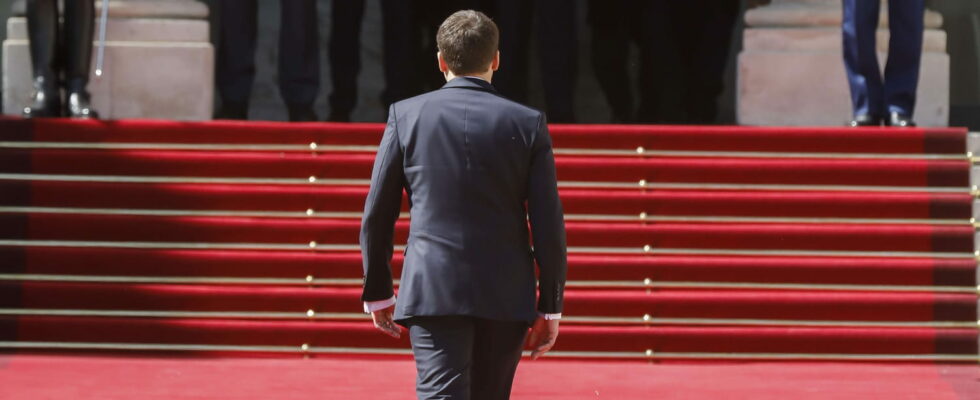As the specter of a heavy defeat in the legislative elections approaches, could Emmanuel Macron shorten his mandate?
The little music began to be played as soon as the dissolution of the National Assembly was announced and the first projections of results concerning the upcoming legislative elections. The probable absence of an absolute majority in the National Assembly, the far right and the union of the left which should have the most deputies and the minority of Macronist deputies: an explosive cocktail which should open an unknown period of cohabitation. No one would have a majority in the Assembly, the government would be made up of who knows who if no absolute majority emerges and, in the middle of all this, the launcher of the “unpinned grenade” – the President of the Republic – whose role is unknown. From there to resign rather than being confined to a simple honorary function?
Let’s throw away the hypothesis straight away: Emmanuel Macron will not resign. At least that’s what he said. First in Le Figaro Magazinethen in a letter addressed to the French. “You can trust me to act as your President until May 2027,” he wrote to the population. A commitment complemented by a statement which already outlines the contours of its future mission. The head of the Elysée sees himself as a “protector at every moment of our Republic, of our values, respectful of pluralism and your choices, at your service and that of the Nation.”
Maintain control over the country
It must be said that, even in the context of cohabitation, a resignation would not change anything since the composition of the National Assembly will necessarily remain the same for one year, as provided for in the Constitution. Calling an early presidential election would therefore have no consequences.
Furthermore, the President of the Republic retains important prerogatives, even without a majority in Parliament. Firstly, he is the one who signs decrees and ordinances – “laws” decided by ministers without a vote in Parliament – and can therefore block them in the event of disagreement. Temporarily and symbolically because the Prime Minister can then transform the text into a bill submitted to Parliament which, if adopted, will then become law.
Also, “Emmanuel Macron can have a say in the Ministry of Defense, to the extent that the Constitution places the president as head of the armed forces, and in the choice of the Minister of Foreign Affairs, since still due to the Constitution, the president is the one who negotiates international treaties and is guarantor of national independence”, explains political scientist Dominique Rousseau to the Point.
On the question of national defense, Emmanuel Macron also remains the sole master of the nuclear force since it is only he who can give the order of engagement. Finally, he keeps (a little) control over the administration of the State since it is he who appoints civil and military posts, notably the prefects.
Stay to weaken the opposition?
Through this dissolution, some see in Emmanuel Macron the calculation of putting a political party in charge of the country in order to discredit it among the French with a view to the 2027 presidential election, while not entrusting it with all the keys to the country.
“By retaining its symbolic and public expression function to take into account the failures and contradictions of the RN in power”, Jérôme Jaffré thus imagines the Head of State “helping the emergence of a renovated central bloc in 2027 and even putting its candidate into orbit.” For the director of the Center for Studies and Knowledge on Public Opinion, “Macron would once again become a point of support for all those who do not want a lasting installation of the RN at the helm of the country”, as he said. entrusted to Figaro.
A resignation forced by an institutional blockage?
It is therefore difficult to imagine Emmanuel Macron resigning. But surprises remain possible, such as the announcement of the dissolution of the Assembly on the evening of June 9. The event was proof of the Head of State’s ability to make radical decisions that contradict his previous statements without warning. As a reminder, while the RN demanded a dissolution in the event of victory in the European elections, the President retorted in an interview for La Tribune Sunday And Provence that “the election of European deputies” would call for a “first European conclusion” and not a national one… The head of state can therefore still change his mind about his resignation.
Especially since a presidential resignation is increasingly considered as a possible scenario after the legislative elections in a particular scenario. If no political force obtains a clear majority in the National Assembly, the government could be plunged into an institutional blockage and become incapable of passing a law. Emmanuel Macron could then judge that the only solution to break the deadlock would be to resign and organize a new presidential election. But this option has flaws, because the election of a new president would not resolve the problem of institutional blockage in the hemicycle.
Can Macron resign to run for president?
But what if Emmanuel Macron were considering resigning to be able to run again in 2027? This is what several Internet users suspect on social networks, but this hypothesis is not credible. A resignation would not allow the head of state to be elected a third time because article 6 of the Constitution limits the number of consecutive mandates possible at the head of state to two: “The President of the Republic is elected for five years by direct universal suffrage. No one can exercise more than two consecutive mandates. A resignation does not change the fact that Emmanuel has already served two mandates, even if the second is not complete. On the contrary, resigning after the legislative elections would deprive the head of the State of his last three years of presidency before a possible new candidacy in 2032.
